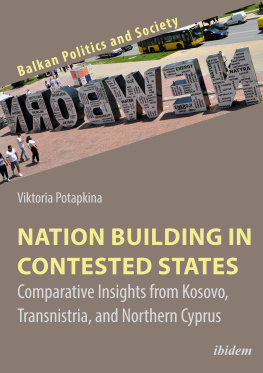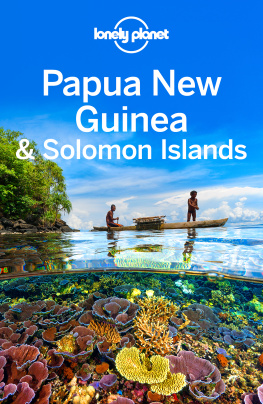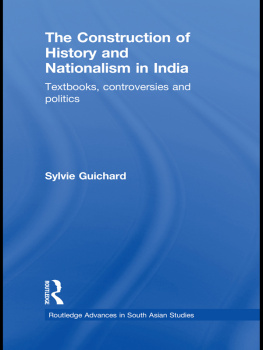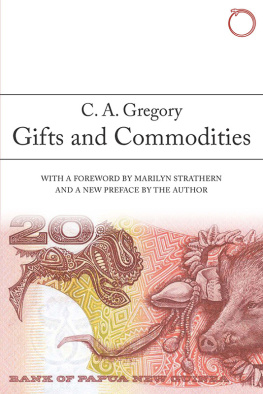This book is a publication of
Indiana University Press
601 North Morton Street
Bloomington, IN 47404-3797 USA
http://iupress.indiana.edu
Telephone orders 800-842-6796
Fax orders 812-855-7931
Orders by e-mail
2002 by Robert J. Foster
All rights reserved
No part of this book may be reproduced or utilized in any form or by any means, electronic or mechanical, including photocopying and recording, or by any information storage and retrieval system, without permission in writing from the publisher. The Association of American University Presses Resolution on Permissions constitutes the only exception to this prohibition.
The paper used in this publication meets the minimum requirements of American National Standard for Information SciencesPermanence of Paper for Printed Library Materials, ANSI Z39.48-1984.
Manufactured in the United States of America
Library of Congress Cataloging-in-Publication Data
Foster, Robert John, date
Materializing the nation : commodities, consumption, and media in Papua New Guinea / Robert J. Foster.
p. cm.
Includes bibliographical references and index.
ISBN 0-253-34147-7 (cloth : alk. paper) ISBN 0-253-21549-8 (pbk.: alk. paper)
1. AnthropologyPapua New Guinea. 2. EthnopsychologyPapua New Guinea. 3. NationalismPapua New Guinea. 4. Consumption (Economics)Papua New Guinea. 5. MaterialismSocial aspectsPapua New Guinea. I. Title.
GN671.N5 F67 2002
305.8009953dc2I
2002001480
1 2 3 4 5 07 06 05 04 03 02
For Andrew M. and Gregory R.
Acknowledgments
Almost all the chapters in this book originated as conference papers; the last chapter began as a seminar given to the Department of Anthropology at the University of Chicago and subsequently given at other universities. I thank the audiences at these various presentations for their interest and comments. I also thank the individual organizers who generously invited me to participate in their conferences, especially Patricia Spyer and Anders Linde-Laursen. Martha Kaplan and John Kelly, old friends and supportive colleagues, invited me to present the paper that became in a plenary session organized by Marshall Sahlins and sponsored by the Wenner-Gren Foundation for Anthropological Research at the annual meeting of the American Society for Ethnohistory (London, Ontario) in October 2000.
In previously publishing some of these chapters, I have benefited from the careful suggestions of several journal editors and anonymous reviewers and from the thoughtful remarks of James Carrier, Nicholas Thomas, Andrew Strathern, Orvar Lfgren, Scott MacWilliam, Dan Jorgensen, John MacAloon, Mark Busse, and Claudia Gross. Deborah Gewertz deserves special thanks for her incisive comments on many occasions.
Mark Busse and Claudia Gross provided me with not only important insights, but also friendship and a home during two visits to Port Moresby. I have similarly enjoyed, in Papua New Guinea (PNG) and Australia, the lively conversation and gracious hospitality of Deborah Gewertz and Frederick Errington, Scott MacWilliam, Margaret Jolly, Nicholas Thomas, Andrew Lattas, Lise McKean, Richard Eves, and Roe Sybylla.
I am grateful to all the people working in commercial media and advertising in PNG who gave me their time and consideration, especially Andrew Johnston and his staff at Pacific View Productions, and John Taylor, former chief executive of EM TV. I also thank Anna Solomon, Phil Sawyer, Steve Landon, Richard Dellman, and Sorariba Nash for sharing their views with me.
For institutional support, I owe a debt of gratitude to both the Institute of Papua New Guinea Studies and the PNG National Research Institute for making my research possible. Wari Iamo, Don Niles, Colin Filer, and Michael Laki have been particularly helpful. I also thank the resourceful and welcoming staff of the Department of Anthropology at the Research School of Pacific and Asian Studies, Australian National University, where I have twice been a visiting fellow. David Robie, former head of the journalism program at the University of Papua New Guinea (UPNG), and a group of students in that program assisted my research in crucial ways. Linus digimRina, head of the Department of Anthropology and Sociology at UPNG, and Baulon Maibala have also offered generous support, which I gratefully acknowledge.
For material aid, I thank the Center for International Studies, University of Chicago; the Australian-American Educational Foundation; the American Council of Learned Societies; the University of Rochester; and the Spencer Foundation. I especially thank the National Endowment for the Humanities, which has been a stalwart supporter of my research projects over the last ten years.
In preparing this book, I have received superb editorial guidance from Rebecca Tolen of Indiana University Press, whose confidence and encouragement I greatly appreciate. For permission to reproduce illustrations and photographs, I thank the PNG Department of Education; the Bank of PNG; PepsiCo, Inc.; Coca-Cola Holdings (Overseas) Limited;The Coca-Cola Company; (PNG) Post-Courier, Anna Solomon and Word Publishing Company; the late Maslyn Williams; Michael OHanlon; and Holly Wardlow. Throughout the book, I have italicized the registered trademarks of PepsiCo, Inc. and The Coca-Cola Company as per agreement with their owners.
Five of the chapters in this book were previously published elsewhere:
, Take Care of Public Telephones: Moral Education and Nation-State Formation in Papua New Guinea. Public Culture 4(2):13145, 1992. Reproduced by permission of Duke University Press.
, Your Money, Our Money, the Governments Money: Finance and Fetishism in Melanesia. In Border Fetishisms: Material Objects in Unstable Places, edited by Patricia Spyer, 6090. New York: Routledge, 1998. Reproduced by permission of Routledge Inc./Taylor & Francis.
, Nation Making and Print Advertisements in Metropolitan Papua New Guinea. In Nation Making: Emergent Identities in Postcolonial Melanesia, edited by Robert J. Foster, 15181. Ann Arbor: University of Michigan Press, 1995. Reproduced by permission of the University of Michigan Press.
, Commercial Mass Media in Papua New Guinea: Notes on Agency, Bodies, and Commodity Consumption. Visual Anthropology Review 12(2): 117, 19961997. Reproduced by permission of the American Anthropological Association.
, The Commercial Construction of New Nations. Journal of Material Culture 4(3):26382, 1999. Reproduced by permission of Sage Publications.
Finally, I thank Nancy Foster for her many gifts, which include countless contributions to this book in matters of style and substance, patience and love.
Materializing the Nation
Introduction
Everyday Nation Making: The Case of Papua New Guinea
Across the humanities and social sciences, over the last twenty years, scholars have rekindled their interest in the subject of nations and nationalism. Their motivation springs not only from the new exigencies of post-cold war politics, but also from a spate of new responses to Ernest Renans old question: What is a nation? Anthropologists, in particular, have welcomed fresh opportunities for treating nations as cultural artifacts, contingent outcomes of social and historical processes variously characterized as imagination, invention, or narration. At the same time, renewed interest in nation making has converged with growing concern inside and outside the academy over globalization, a term loosely used to name the rapid circulation of people and money, images and ideas, through complicated networks of almost planetary scope (see Foster 1991 for a review). Two related questions thus continue to attract broad attention. By what ways and means, agents and agencies, have nations been made, remade, and unmade? And what possibilities for making nations have been opened up and shut down by the shifting and uneven effects of intensifying globalization?







